Le pagine della rivista, nella raccolta curata da James Austen nel 1792, e, di seguito, il testo del preambolo, della lettera e della risposta redazionale, che costituivano l'intero numero.

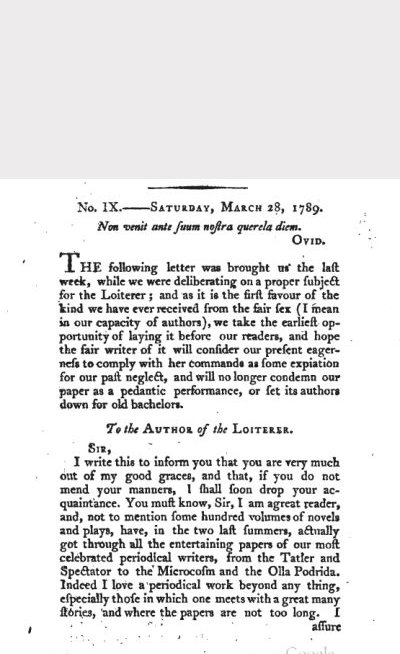
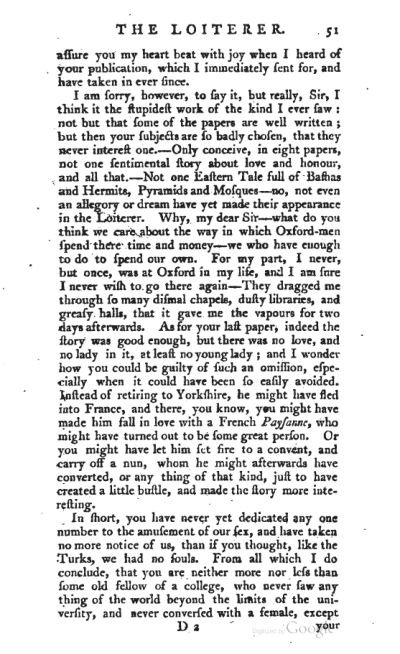
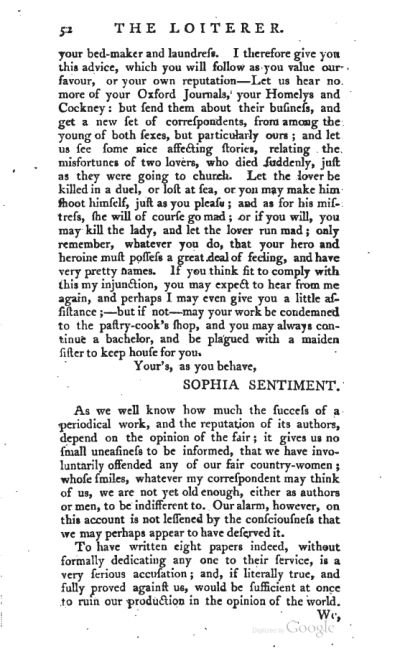
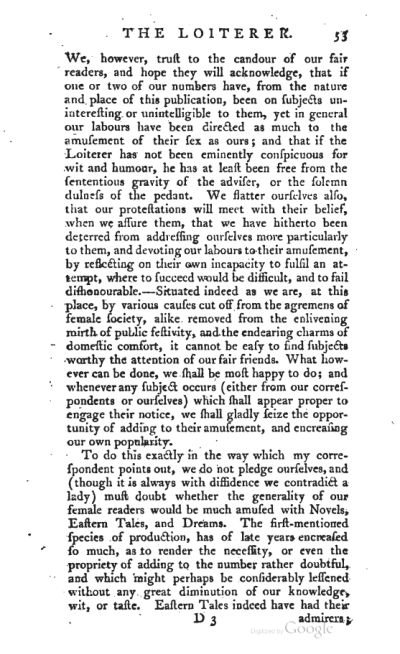
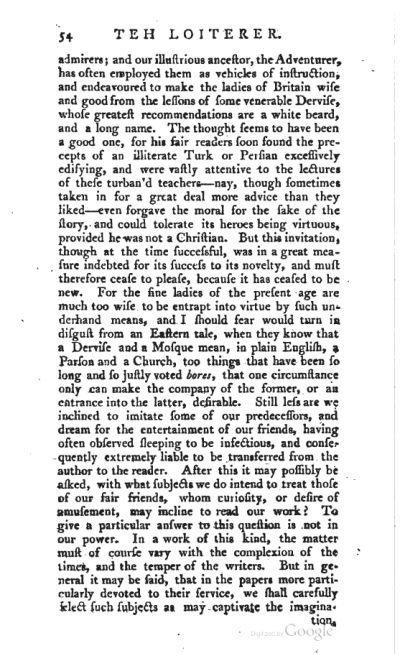

|
Jane Austen The Loiterer |
|
Nel n. 9 della rivista "The Loiterer", curata e in genere completamente scritta da James e Henry Austen, apparve una lettera firmata "Sophia Sentiment", attribuita da diversi biografi a Jane Austen; altri invece ritengono che sia stata scritta da uno dei due fratelli. È comunque interessante conoscerla. Per ulteriori particolari sull'attribuzione, vedi la parte finale dell'Introduzione agli Juvenilia Le pagine della rivista, nella raccolta curata da James Austen nel 1792, e, di seguito, il testo del preambolo, della lettera e della risposta redazionale, che costituivano l'intero numero.
|
|
No. IX. --- SATURDAY, MARCH 28, 1789.
Non venit ante suum nostra querela diem. OVID.
The following letter was brought us the last week, while we were deliberating on a proper subject for the Loiterer; and as it is the first favour of the kind we have ever received from the fair sex (I mean in our capacity of authors) we take the earliest opportunity of laying it before our readers, and hope the fair writer of it will consider our present eagerness to comply with her commands as some expiation for our past neglect, and will no longer condemn our paper as a pedantic performance, or set its authors down for old bachelors.
To the AUTHOR of the LOITERER.
SIR, I write this to inform you that you are very much out of my good graces, and that, if you do not mend your manners, I shall soon drop your acquaintance. You must know, Sir, I am a great reader, and not to mention some hundred volumes of Novels and Plays, have, in the last two summers, actually got through all the entertaining papers of our most celebrated periodical writers, from the Tatler and Spectator to the Microcosm and the Olla Podrida. Indeed I love a periodical work beyond any thing, especially those in which one meets with a great many stories, and where the papers are not too long. I assure you my heart beat with joy when I first heard of your publication, which I immediately sent for, and have taken in ever since. I am sorry, however, to say it, but really, Sir, I think it the stupidest work of the kind I ever saw: but not that some of the papers are well written; but then your subjects are so badly chosen, that they never interest one. – Only conceive, in eight papers, not one sentimental story about love and honour, and all that. – Not one Eastern Tale full of Bashas and Hermits, Pyramids and Mosques – no, not even an allegory or dream have yet made their appearance in the Loiterer. Why, my dear Sir – what do you think we care about the way in which Oxford men spend their time and money – we, who have enough to do to spend our own. For my part, I never, but once, was at Oxford in my life, and I am sure I never wish to go there again – They dragged me through so many dismal chapels, dusty libraries, and greasy halls, that it gave me the vapours for two days afterwards. As for your last paper, indeed, the story was good enough, but there was no love, and no lady in it, at least no young lady; and I wonder how you could be guilty of such an omission, especially when it could have been so easily avoided. Instead of retiring to Yorkshire, he might have fled into France, and there, you know, you might have made him fall in love with a French Paysanne, who might have turned out to be some great person. Or you might have let him set fire to a convent, and carry off a nun, whom he might afterwards have converted, or any thing of that kind, just to have created a little bustle, and made the story more interesting. In short, you have never yet dedicated any one number to the amusement of our sex, and have taken no more notice of us, than if you thought, like the Turks, we had no souls. From all which I do conclude, that you are neither more nor less than some old Fellow of a College, who never saw any thing of the world beyond the limits of the University, and never conversed with a female, except your bed-maker and laundress. I therefore give you this advice, which you will follow as you value our favour, or your own reputation. – Let us hear no more of your Oxford Journals, your Homelys and Cockney: but send them about their business, and get a new set of correspondents, from among the young of both sexes, but particularly ours; and let us see some nice affecting stories, relating the misfortunes of two lovers, who died suddenly, just as they were going to church. Let the lover be killed in a duel, or lost at sea, or you may make him shoot himself, just as you please; and as for his mistress, she will of course go mad; or if you will, you may kill the lady, and let the lover run mad; only remember, whatever you do, that your hero and heroine must possess a great deal of feeling, and have very pretty names. If you think fit to comply with this my injunction, you may expect to hear from me again, and perhaps I may even give you a little assistance: – but, if not – may your work be condemned to the pastry–cook's shop, and may you always continue a bachelor, and be plagued with a maiden sister to keep house for you. Your's, as you behave, SOPHIA SENTIMENT.
As we well know how much the success of a periodical work, and the reputation of its authors, depend on the opinion of the fair; it gives us no small uneasiness to be informed, that we have involuntarily offended any of our fair countrywomen; whose smiles, whatever my correspondent may think of us, we are not yet old enough, either as authors or men, to be indifferent to. Our alarm, however, on this account is not lessened by the consciousness that we may perhaps appear to have deserved it. To have written eight papers indeed, without formally dedicating any one to their service, is a very serious accusation; and, if literally true, and fully proved against us, would be sufficient at once to ruin our production in the opinion of the world. We, however, trust to the candour of our fair readers, and hope they will acknowledge, that if one or two of our numbers have, from the nature and place of this publication, been on subjects uninteresting or unintelligible to them, yet in general our labours have been directed as much to the amusement of their sex as ours; and that if the Loiterer has not been eminently conspicuous for wit and humour, he has at least been free from the sententious gravity of the adviser, or the solemn dullness of the pedant. We flatter ourselves also, that our protestations will meet with their belief, when we assure them, that we have hitherto been deterred from addressing ourselves more particularly to them, and devoting our labours to their amusement, by reflecting on our own incapacity to fulfil an attempt, where to succeed would be difficult, and to fail dishonourable. – Situated indeed as we are, at this place, by various causes cut off from the agrêmens of female society, alike removed from the enlivening mirth of public festivity, and the endearing charms of domestic comfort, it cannot be easy to find subjects worth the attention of our fair friends. What however can be done, we shall be most happy to do; and whenever any subject occurs (either from our correspondents or ourselves) which shall appear proper to engage their notice, we shall gladly seize the opportunity of adding to their amusement, and encreasing our own popularity. To do this exactly in the way which my correspondent points out, we do not pledge ourselves, and (though it is always with diffidence we contradict a lady) must doubt whether the generality of our female readers would be much amused with Novels, Eastern Tales, and Dreams. The first mentioned species of production, has of late years increased so much, as to render the necessity, or even the propriety of adding to the number rather doubtful, and which might perhaps be considerably lessened without any great diminution of our knowledge, wit or taste. Eastern Tales indeed have had their admirers; and our illustrious ancestor, the Adventurer, has often employed them as vehicles of instruction, and endeavoured to make the Ladies of Britain wise and good from the lessons of some venerable Dervise, whose greatest recommendations are a white beard, and a long name. The thought seems to have been a good one, for his fair readers soon found the precepts of an illiterate Turk or Persian excessively edifying, and were vastly attentive to the lectures of these turban'd teachers – nay, though sometimes taken in for a great deal more advice than they liked – even forgave the moral for the sake of the story, and could tolerate its heroes being virtuous, provided he was not a Christian. But this invention, though at the time successful, was in a great measure indebted for its success to its novelty, and must therefore cease to please, because it has ceased to be new. For the fine ladies of the present age are much too wise to be entrapt into virtue by such underhand means, and I should fear would turn in disgust from an Eastern Tale, when they know that a Dervise and a Mosque mean, in plain English, a Parson and a Church, two things that have been so long and so justly voted bores, that one circumstance only can make the company of the former, or an entrance into the latter, desirable. Still less are we inclined to imitate some of our predecessors, and dream for the entertainment of our friends, having often observed sleeping to be infectious, and consequently extremely liable to be transferred from the author to the reader. After this it may possibly be asked, with what subjects we do intend to treat those of our fair friends, whom curiosity, or desire of amusement, may incline to read our work? To give a particular answer to this question is not in our power. In a work of this kind, the matter must of course vary with the complexion of the times, and the temper of the writers. But in general it may be said, that, in the papers more particularly devoted to their service, we shall carefully select such subjects as may captivate the imagination, without offending the judgment, and interest the feelings, without misleading the heart. S. |
No. IX. --- SABATO, 28 MARZO 1789.
Non venit ante suum nostra querela diem. OVID.
La lettera che segue ci è stata recapitata la scorsa settimana, mentre stavamo decidendo un appropriato argomento per il Loiterer; e dato che è il primo omaggio del genere da noi mai ricevuto dal gentil sesso (intendo nella nostra veste di redattori) cogliamo questa prima opportunità per presentarla ai nostri lettori, e speriamo che la sua bella redattrice vorrà considerare il nostro presente zelo a conformarci ai suoi comandi come parziale espiazione della passata negligenza, e non vorrà più giudicare la nostra rivista come una pedante esibizione, o relegare gli autori nel ruolo di vecchi scapoli.
Al REDATTORE del LOITERER.
SIGNORE, Vi scrivo per informarvi che siete davvero fuori dalle mie grazie, e che, se non correggerete il vostro modo di fare, rinuncerò presto alla vostra conoscenza. Dovete sapere, Signore, che io sono una grande lettrice, e senza menzionare le diverse centinaia di volumi di Romanzi e di Commedie, ho, nelle ultime due estati, letteralmente saccheggiato tutti gli spassosi articoli delle più celebrate riviste periodiche, dal Tatler e lo Spectator al Microcosm e a Olla Podrida. Infatti io amo i periodici al di sopra di qualsiasi cosa, in particolare quelli nei quali ci si imbatte in un gran numero di narrazioni, e dove gli articoli non sono troppo lunghi. Vi assicuro che il mio cuore ha sprizzato gioia quando ho saputo per la prima volta della vostra pubblicazione, che mi sono immediatamente fatta inviare, e da allora ho sempre preso. Tuttavia, mi dispiace dirlo, la ritengo davvero, Signore, la più stupida cosa di questo tipo che abbia mai visto: non che alcuni articoli non siano ben scritti, ma il fatto è che gli argomenti sono scelti talmente male, che non riuscirebbero a interessare nessuno. - Basti pensare che, in otto numeri, non c'è stata nemmeno una storia romantica su amore e onore, e via discorrendo. - Nemmeno un Racconto Orientale pieno di Pascià ed Eremiti, Piramidi e Moschee - no, mai nemmeno un'allegoria o un sogno hanno fatto la loro apparizione nel Loiterer. Ma insomma, mio caro Signore - che cosa vi fa pensare che ci possa importare qualcosa del modo in cui gli uomini spendono tempo e denaro a Oxford - a noi, che abbiamo abbastanza da fare per spendere il nostro. Da parte mia, mai, se non una volta, sono stata a Oxford in vita mia, e sono certa che non vorrò mai più andarci - Mi hanno trascinata attraverso così tante cappelle lugubri, biblioteche polverose, e saloni scivolosi, che mi hanno reso malinconica per i due giorni successivi. Quanto al vostro ultimo numero, a dire il vero, la storia era abbastanza buona, ma non c'erano scene d'amore, e nemmeno una donna, almeno una giovane; e mi chiedo come avete potuto rendervi colpevoli di una tale omissione, specialmente perché avrebbe potuto essere facilmente evitata. Invece di ritirarsi nello Yorkshire, lui avrebbe potuto fuggire in Francia, e lì, lo sapete, potevate farlo innamorare di una Paysanne francese, che poi si sarebbe rivelata una persona di nobili natali. Oppure potevate fargli appiccare il fuoco a un convento, e portar via una suora, che poi l'avrebbe convertito, o qualcosa del genere, giusto per creare un po' di movimento, e rendere la storia più interessante. Per farla breve, ancora non avete mai dedicato nessun numero allo svago del nostro sesso, e non ci avete tenute in nessuna considerazione, come se pensaste, come i turchi, che non abbiamo un'anima. Da tutto ciò devo concludere, che voi siate né più né meno che un qualche vecchio Membro di un College, che non ha mai visto nulla del mondo al di fuori dei confini dell'Università, e non ha mai conversato con una donna, salvo cameriere e lavandaie. Perciò vi do questo consiglio, che potrete seguire per quanto valutate il nostro favore, o la vostra stessa reputazione. - Non dateci più notizie della vostra vita quotidiana a Oxford, dei vostri Amici e dei vostri Londinesi: ma lasciateli alle loro faccende, e prendetevi un nuovo gruppo di corrispondenti, tra i giovani di entrambi i sessi, ma in particolare del nostro; e fateci leggere qualche bella storia toccante, relativa alle disgrazie di due amanti, che muoiono all'improvviso, proprio mentre stanno andando in chiesa. Fate che l'amante sia ucciso in duello, o scompaia in mare, oppure si spari, come volete; e quanto alla sua amante, naturalmente diventerà pazza; o se volete, potete uccidere la signora, e far diventare matto l'amante; ricordate solo, qualsiasi cosa facciate, che l'eroe e l'eroina devono possedere un bel po' di sentimento, e avere nomi graziosi. Se siete disposto ad accettare questi miei ordini, potete aspettarvi di leggermi nuovamente, e forse potrei persino concedervi un piccolo aiuto: - ma, in caso contrario - possa il vostro lavoro essere condannato a diventare incarto da pasticceria, e voi continuare a restare sempre scapolo, e a essere tormentato da una sorella zitella che vi fa da governante. La vostra, secondo come vi comporterete, SOPHIA SENTIMENT.
Visto che sappiamo bene come il successo di un periodico, e la reputazione dei suoi redattori, dipenda dall'opinione del gentil sesso; ci mette non poco a disagio essere informati, che abbiamo involontariamente offeso qualcuna delle nostre belle concittadine; ai cui sorrisi, qualunque cosa la nostra corrispondente possa pensare di noi, non possiamo restare indifferenti, visto non siamo vecchi abbastanza, né come autori né come uomini. La nostra preoccupazione in merito, tuttavia, non è attenuata dalla consapevolezza di aver forse dato l'impressione di averla meritata. In effetti aver scritto otto numeri, senza dedicarne esplicitamente nessuno a loro, è un'accusa molto seria; e, se fosse vera, e con prove schiaccianti contro di noi, sarebbe sufficiente da sola a mandare in rovina la nostra produzione agli occhi del mondo. Noi, tuttavia, confidiamo nella sincerità delle nostre belle lettrici, e speriamo che esse riconosceranno, che se uno o due dei nostri numeri sono stati, per la natura e il luogo di questa pubblicazione, dedicati ad argomenti per loro privi di interesse o incomprensibili, in generale i nostri sforzi si sono indirizzati tanto al divertimento del loro sesso quanto a quello del nostro; e che se il Loiterer non è stato particolarmente ricco di arguzia e umorismo, è rimasto almeno scevro dalla sentenziosa gravità degli accademici, o dalla solenne tediosità dei pedanti. Ci lusinghiamo anche, di credere che le nostre proteste troveranno un punto di unione con le loro convinzioni, quando le assicureremo, che finora siamo stati dissuasi dall'indirizzarci con maggiore evidenza a loro, e di consacrare i nostri sforzi al loro divertimento, da riflessioni sulla nostra incapacità di portare a compimento un tentativo in un campo in cui avere successo sarebbe difficile, e fallire disonorevole. - In effetti situati come siamo, in questo luogo, per varie cause tagliato fuori dalle attrattive della società femminile, così come lontano dalle vivaci gioie delle pubbliche feste, e dai dolci incanti delle comodità domestiche, non può essere facile trovare argomenti degni dell'attenzione delle nostre belle amiche. Ciò che tuttavia potrà essere fatto, saremo estremamente felici di farlo; e ogniqualvolta emergesse un argomento (sia dalle nostre corrispondenti che da noi stessi) che apparirà adatto a suscitare la loro attenzione, saremo lieti di cogliere l'occasione di aggiungerlo per il loro divertimento, e per accrescere la nostra popolarità. Farlo esattamente nel modo che indica la mia corrispondente, non possiamo prometterlo, e (anche se usiamo sempre prudenza nel contraddire una signora) dubitiamo che il complesso delle nostre lettrici si divertirebbe con Romanzi, Racconti Orientali, e Sogni. Il primo tipo di prodotti menzionati, si è talmente incrementato negli ultimi anni, da rendere la necessità, o l'opportunità di aggiungerne altri piuttosto dubbia, e forse la produzione potrebbe essere diminuita senza in pratica pregiudicare conoscenze, arguzia o gusto. I Racconti Orientali hanno in effetti i loro ammiratori; e i nostri illustri antenati, gli Esploratori, li hanno spesso utilizzati come veicoli di insegnamento, e hanno tentato di rendere le Signore britanniche sagge e buone attraverso le lezioni di un qualche venerabile Derviscio, le cui principali qualità erano una barba bianca, e un lungo nome. L'dea sembra aver funzionato, poiché le belle lettrici presto trovarono i precetti di un turco o di un persiano illetterato estremamente edificanti, ed erano molto assidue alle conferenze di questi insegnanti inturbantati - anzi, benché talvolta sommerse da un numero di consigli molto maggiore di quanti ne gradissero - sorvolavano sulla morale per amore della storia, considerando virtuosi i suoi eroi, a condizione che non fossero Cristiani. Ma questa invenzione, benché a quel tempo fosse apprezzata, doveva gran parte del proprio successo alla novità, ed era perciò destinata a non piacere più, perché non era più nuova. Anche perché le signore raffinate dei nostri giorni sono troppo sagge per cadere nella trappola di virtù dispiegate con mezzi così subdoli, e avrei timore che sarebbero disgustate da un Racconto Orientale, una volta saputo che per un Derviscio e una Moschea si intendono, in inglese corrente, un Pastore e una Chiesa, due cose che sono state da tempo e a ragione considerate noiose, tanto che solo una circostanza può far diventare desiderabile essere in compagnia del primo, o entrare nella seconda. Ancora meno siamo propensi a imitare alcuni dei nostri predecessori, e sognare per il divertimento delle nostre amiche, avendo spesso osservato come il dormire sia contagioso, e di conseguenza sia estremamente soggetto a trasferirsi dall'autore al lettore. Dopo di ciò ci si può chiedere, con quale argomento intendiamo soddisfare quelle delle nostre belle amiche che si sentono propense, per curiosità, o desiderio di divertirsi, a leggere i nostri lavori? Dare una risposta specifica a questa domanda non è in nostro potere. In un lavoro di questo genere, la materia deve naturalmente adattarsi alle peculiarità dei tempi, e al temperamento di chi scrive. Ma in generale si può dire, che, negli articoli più particolarmente dedicati a loro, avremo cura di scegliere argomenti che possano catturare l'immaginazione, senza offendere il giudizio, e interessare i sentimenti, senza ingannare il cuore. S. |